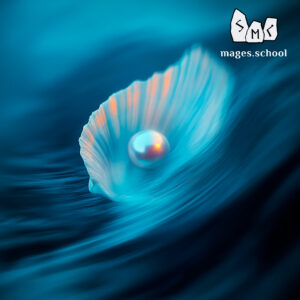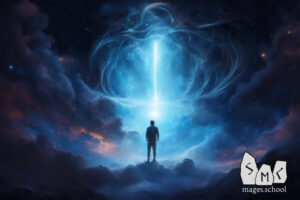ASTRAL BODY
In this course you will unlock the potential of your inner energy, learn how to manage the power of your emotions and how to direct it towards the achievement of your goals.
What do emotions mean in a person’s life? To answer this question, try to imagine life without them, not only for yourself but also for those around you. Try to imagine a person who has a body, sensations, thoughts, experiences, opinions, beliefs, values, habits, but doesn’t have desires, passions, excitement, sadness, joy, hopes and expectations. He probably won’t be a human any more, but something like a biorobot.
Human life is unimaginable without emotions, they add colour and brightness to life. Moreover, emotions are the material from which our desires are built.
What can a person without desires achieve? Would you be able to achieve anything in this life if you had no desires? If only ‘I must’ was present in life, but not ‘I want’?
2nd Main Course – Astral Body
4 basic lessons of the 2nd course of the Main department “Liberation of Consciousness»
In magic, the astral plane is the sphere of human emotion – it is an infinite source of energy, the space of realisation and connection with the various realms of different life forms. The ability to expand one’s astral body and transcend the boundaries of astral space is a necessary and mandatory skill for any practitioner. Topics such as managing emotions, working with the Astral body, lucid dreaming and astral cleansing are explored in depth in this course.
Duration: 4 days
Admission prerequisites: completion of the 1st course of the Main department (Etheric body)
SENIOR COURSES TRANSITION GUIDELINES
At this course you will:
- learn how to distinguish your own desires from those imposed by others
- acquire the skill of managing emotions
- do a practical work with the Astral body
- practise lucid dreaming
- learn to perform Astral cleansing, a technique that releases resources from your own subconscious
- develop the skill of reprogramming
- develop correct desire formation
- free your consciousness from the fears and consequences of emotional trauma
- gain a natural mechanism for fulfilling your own desires
After completing the 4 basic lessons of the 2nd Main course, it is recommended to study the additional seminars in the following order:
Diagnostics and Correction of the Astral Body Damage (AB Cleansing)
Specific Astral Body Cleansing, Various Topics
Emotional Hygiene. Emotional Meditation Technique
The textbook to the 2nd course (Astral body) of the Main Department
These seminars will be available in English soon! Stay tuned!
In order to participate in online group sessions or to purchase pre-recorded videos contact school coordinator Diana – diana@mage.school
Emotions and desires
The sensations formed in the Etheric body are the source of nourishment for all the higher levels of our consciousness. And the next step in the evaluation, transformation and conversion of this subtle energy is an emotional response. Responses to certain sensations are immediate and automatic and are determined by two mechanisms: the vital and the creative.
In terms of vitality, the sensation is rated on a “dangerous-safe” scale, which corresponds to “unpleasant-pleasant” in the inner world. If the sensation is rated as dangerous, an automatic, nature-driven action will follow. For example, if you touch a hot object, you pull your hand away faster than you realise it is hot. This prevents exposure that is too dangerous and could have irreversible consequences. If the intensity of the exposure is lower and the sensation is weaker, the situation is rated as non-critical on the safety scale. In this case, it is possible to recognise and assess what is happening.
In this case, the continued contact with the source of sensations (hot, but not traumatic) can already be rated on the second scale, which relates to the mechanism of creativity. It rates the sensation on a “boring – interesting” scale. If the interaction is safe, you can see whether the cup is tea or coffee. Notice this and decide what action to take (drink or refuse).
Now we have moved on to the main part – the mechanisms of emotional response and desire formation. Astral reactions are the most ancient and fundamental forms of reaction that are present even in the simplest organisms. Even a single-celled creature reacts clearly to an aggressive environment, trying as best it can to end contact with a dangerous object. And if there is something edible nearby, you can be sure that it will make every effort to get closer to the food. Biological responses have evolved over millions of years. Throughout evolution, living organisms have retained the best and most efficient qualities.
Today, a mechanism of biological responses has become a unique defence system. It helps animals to survive and humans to avoid danger and choose the easiest way to fulfil their desires.
From a biological perspective, the Astral response is the source of the drive that creates the conditions for action in the psyche and physical body. In the physical body, there is a powerful release of hormones and other bioactive substances that prepare the body to expend energy. At the next stage, biochemical reactions lead to the breakdown of molecules and the release of energy which is used to perform an action. From the side of the mental processes, the astral reaction signals the quality of the contact and predetermines further features of the interaction.
But is it only the inner world that can be a source of sensation for human beings? Of course not. The cause of vivid sensations and emotions can be a person’s inner world and physical body. Thoughts, memories, ethical issues can cause emotions and vivid experiences. The needs of the physical body must be met to maintain vitality. Changes in the state of the physical body can be detected by changes in sensation. For example, when blood sugar levels drop, we feel hungry. At first the intensity is low and we can continue with our activity. But after a while the sensation intensifies, attention is drawn away from the activity, but we can still concentrate on what is happening through the power of will.
However, when the need for energy becomes critical, we experience a strong desire to eat. This desire will trigger a search for food. And the more intense the feeling of hunger, the more effort we will put into satisfying it. Compare the desire to eat sushi with the desire to satisfy a hunger that has been going on for a few days. Sushi can wait until the right moment, but if you have been hungry for a long time, you cannot do anything.
Anyone who has tried conscious fasting knows that hunger is perceived differently depending on your inner motivation. For example, it is much easier to abstain from food during fasting or medical fasting than during forced fasting due to lack of food. Such a variety of responses has to do with the fact that, in addition to biological motivations, social and spiritual motivations play a crucial role in human consciousness.

